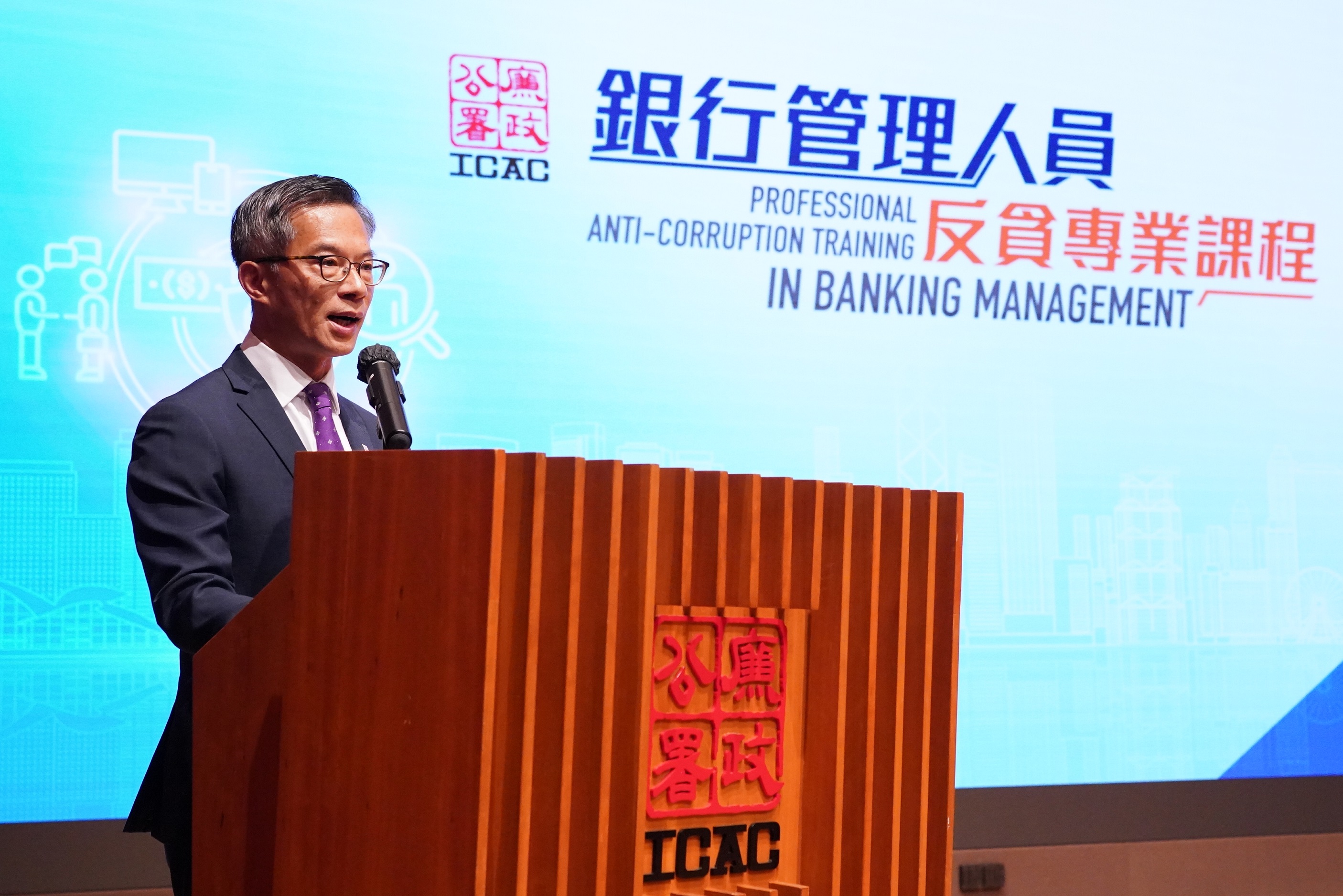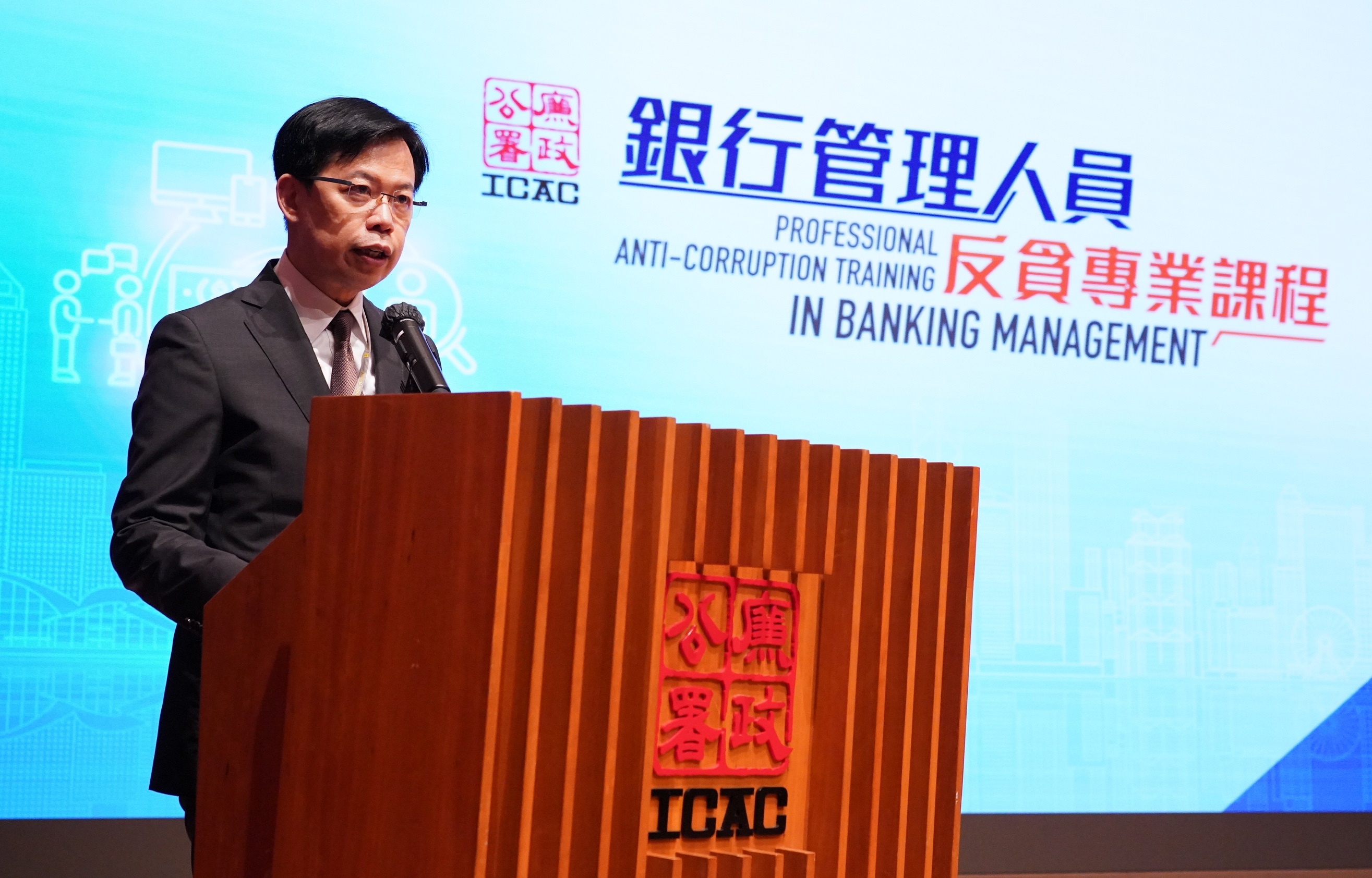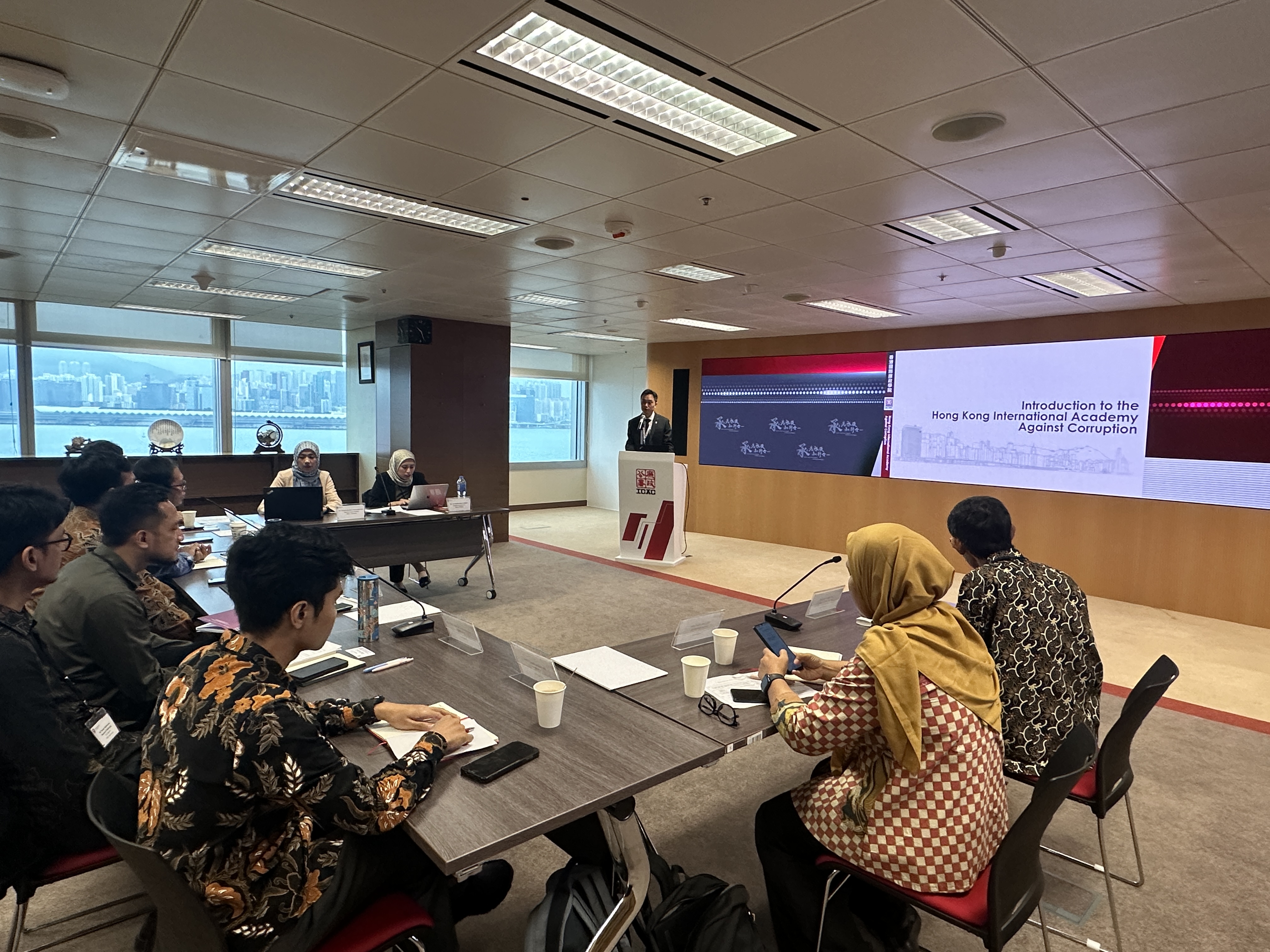ICAC hosts first tailored high-level professional training course for senior bank managers
2023-3-31
Over 30 senior managerial staff from the banking sector today (March 31) completed the ICAC’s Professional Anti-Corruption Training in Banking Management, the first-ever high-level professional anti-corruption training programme in Hong Kong featuring real corruption case analysis. The programme was also the first pilot project of the International Anti-corruption Academy, Hong Kong, to be set up by the ICAC.
Acting ICAC Commissioner Mr Ricky Yau Shu-chun today presented certificates to bank representatives who completed the training programme. Speaking at the closing ceremony, Yau said the banking industry was one of the crucial components of economic development and an important pillar of Hong Kong as an international financial centre. “Corruption will not only damage the image and reputation of the banking industry, but will also cause detrimental loss to the entire financial system. Establishing an effective mechanism and supervision system to tackle and prevent corruption is not only the responsibility of the banking sector, but also the common expectation of the society,” Yau said.
Yau said he hoped the training programme could help further enhance the professional standard of the banking sector, and provide practical assistance in establishing an even more transparent, cleaner and effective financial system in Hong Kong. He also called on practitioners to jointly safeguard a clean and fair banking industry.
Legislative Council member Mr Ronick Chan Chun-ying, representing the Finance Functional Constituency and who also officiated at today’s closing ceremony, remarked that the content of the tailored programme was in-depth and met the needs of the industry. “Enhancing the banking industry’s risk management capabilities and its standard of corporate integrity is crucial for promoting the country's economic development and the sound operation of the financial system. Along with their own functions, banks in Hong Kong should at the same time assist in fostering a stable financial system and support the economic development of the country and Hong Kong,” Chan said.
The ICAC professional training was attended by representatives of over 30 locally licensed banks, including the note-issuing banks in Hong Kong. Participants were mainly heads or managerial personnel of compliance or audits in their respective organisations, overseeing areas such as corporate governance, internal control and anti-corruption. The programme covered three main themes: detecting corruption, corruption prevention and building and fostering an ethical culture in a bank, applying the ICAC’s three-pronged approach of enforcement, prevention and education in anti-corruption work in the banking sector.
For the first time, the training programme featured studies of the latest corruption trend and modus operandi in the banking sector through analysis of case scenario adapted from ICAC investigations. Seasoned frontline ICAC investigators shared their observation and experience with participants, particularly those in relation to cases which caused financial loss to banks and financial institutions as a result of corruption or fraud. The ICAC’s forensic accounting experts also shared with participants the role of forensic accounting in detecting corruption and related crimes. Participants were also shown how an effective “detective control” mechanism and whistle-blowing policy in banks could facilitate early detection of corruption.
To help participants better understand the work of the Commission, participants were given a guided tour to different operation-related facilities in the ICAC Headquarters, including the Video Interview Rooms and the Identification Parade Suite.
On the preventive front, officers of the Corruption Prevention Department (CPD) hosted exchange sessions with participants on the importance of integrity risk management, anti-corruption controls, as well as enhancing corruption prevention capabilities through digitalisation and IT applications. The training covered corruption risks in major areas in bank management, including opening of bank accounts, approval of credit facilities, sales procedures, procurement and staff management, and suggested relevant safeguards, and a workshop for participants to apply the learnings on the spot.
In addition, officers of the Community Relations Department (CRD), through case studies, group discussion and interaction with bank representatives, discussed behavioural red flags at workplaces as well as ways to mitigate non-compliance risks from people’s perspective. They also introduced the keys for staff conduct management as well as the importance of promoting a probity culture in banks.
The ICAC training programme was supported by regulatory and financial advisory bodies of the banking sector, all of which have been the Commission’s valued partners in promoting a probity culture. Guest speakers included Hong Kong Monetary Authority (HKMA) Executive Director (Banking Conduct) Mr Alan Au Yuk Lun, who spoke on the regulator’s expectation on fostering an integrity and anti-corruption culture in banks, as well as the Mandatory Reference Checking Scheme. Another guest speaker – Director and Head of Policy Research of the Financial Services Development Council Dr Rocky Tung Yat Ngok, shared with participants integrity management in banks and virtual assets industry. Meanwhile, Ms Alieza Chan Chung-yin, Secretary of the Hong Kong Associations of Banks, Ms Carrie Leung Ka-lai, Chief Executive Officer of the Hong Kong Institute of Bankers, and representatives of the Hong Kong Association of Restricted Licence Banks and Deposit-taking Companies also attended today’s ceremony.
To further enhance the industry’s anti-graft capabilities, the CPD has also launched the latest Corruption Prevention Guide for Banks, providing practical guidance on anti-bribery legislation, elements of good corporate governance and effective anti-corruption control. The Case Studies and Red Flags featured in the Guide serve as a reference for banking practitioners in assessing corruption risks as well as devising corresponding safeguards in their core operations such as opening of bank accounts, handling credit facility and loan applications, sales procedures and wealth management
The CRD offers diversified support to the banking sector, and launches the Ethics Promotion Programme for the Banking Industry, including the production of a self-learning animation series “Unveil the Secret: Integrity Myths in the Banking Industry” to help frontline bank staff understand common corruption “myths” in the industry. A leaflet named “Bank Client Smartpedia” is also produced to dispel common misconceptions from bank clients’ perspective to avoid breaches of the law. The ICAC will approach all local authorized institutions under HKMA’s supervision and provide related preventive education resources. The Commission will also continue to provide trainings, exchanges to the banking industry.




